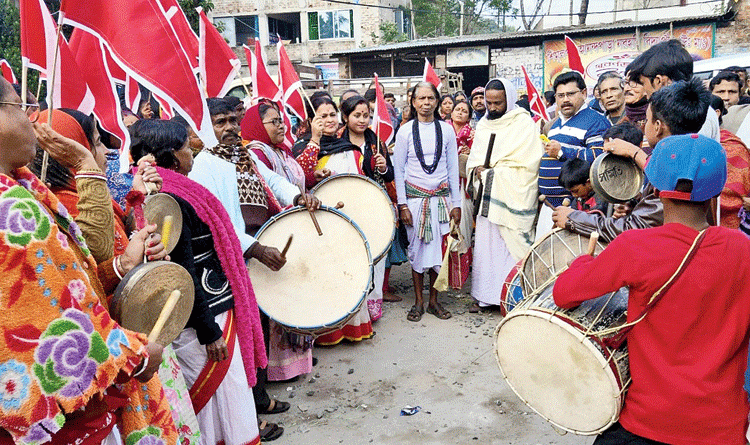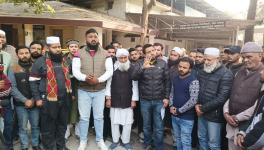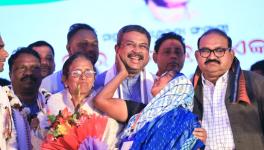West Bengal: Matua Community Demands Refugee Rehabilitation Package From Union Govt., Calls out CAA-NRC

A programme by a Matua outfit against the CAA. Image Courtesy: Telegraph India
Parimal Mistry (50) is a matua refugee (matuas are a subaltern caste and followers of Harichand Guruchand Thakur, a social reformer of Bangladesh) whose father came to India after the cut-off period of 1948 fixed by the Central government. Many of Mistry's neighbours in the Bagjola camp area of Nadia district have come after March 25, 1971- the cut-off date fixed according to the Indira-Mujib accord in 1972.
However, despite staying for so long in India, most did not receive any rehabilitation packages and are part of the 1,700 colonies of refugees, which are sans any government recognition in West Bengal.
"We are being mistreated in India. India is our country of birth; still, the Central government refers to us as ghuspetias and termites," Mistry said.
He also criticised the matua leadership, saying that despite having all the identity proofs, (Voter ID, Aadhar card, Pan card) given to the community during the Left Front governments in the state, there are questions about additional citizenship documents.
"To get votes, matua community members are being harassed as late entrants to the country," he said.
Mistry, an advocate by profession, used to work as a rickshaw puller in the Bagjola camp area to make a living when he was studying to become a lawyer.
Three types of matua families stay in the camp. Families such as Mistry's who bought lands in the area from the owners to stay here; second, residents who received lands as a part of the rehabilitation packages of the state government before 2011; third, late entrants who neither have lands nor they have the money to make such purchases. The third type of people stays in slums nearby the Bagjola canal.
Satyendranath Das, an elderly matua, candidly says, "At present, the matua Thakurbari is divided into two sections, based on the leanings with either the BJP-led (Bharatiya Janata Party) Central government or TMC (Trinamool Congress) government in the state. There is no love lost between these sections; a regular anarchical situation prevails in the area. Matuas received citizenship documents in the state, and the area has modern infrastructure due to the hard work of Kanti Biswas, former education minister."
"United Central Refugee Council (UCRC), a West Bengal-based organisation for refugee rehabilitation, helped the community. During the Left era, the government recognised many matua colonies, with many community members receiving seven bighas of land to start cultivation," he said.
A retired school clerk, Das is a devout follower of the sect; many followers are either traditional fisherpeople or are involved in menial jobs; they come from subaltern castes.
"Most matuas who live in the North 24 Parganas district have valid citizenship documents, such as ration cards, voter IDs, etc. Many community members stay in slums beside the railway line but have citizenship documents. These NRC (National Register of Citizens, CAA (Citizenship Amendment Act) and NPR (National Population Register) are tools of the BJP government to de-recognise matuas as citizens of the country. However, a section in the community is being wrongly motivated and is supporting the Central government, with of aim of getting citizenship cards which are till now non-existent in India," Das said.
Madhu Datta, UCRC state secretary and a veteran leader of the refugee rehabilitation movement, lives in a refugee colony in the Barasat area. He said that his organisation, which carries on the legacy of legendary refugee movement leader Samar Mukherjee (a former MP and CPIM Polit Bureau member), is now demanding a package of Rs 5,010 crore from the Central government as part of the refugee rehabilitation package. The Buddhadeb Bhattacharya government first demanded such a package in 2007.
Since coming to power in 2011, TMC hasn't shown any particular interest in the issue of refugee rehabilitation. In 2011, the TMC government merged the refugee rehabilitation department with the land revenue department, seriously hampering the cause.
"If one looks at historical documents, it can be observed that after independence, the eastern side of the country received the lowest help from Central governments for refugee rehabilitation. This step-motherly attitude still continues towards West Bengal, which had seen the partition of Bengal in 1947 and the aftermath of the Bangladesh war in 1971. Both these events resulted in many refugees coming to the region. Around 1.5 lakh families living in 1,700 unrecognised colonies are yet to receive any rehabilitation package. Around 2.5 lakh families are waiting to get possession rights of their current accommodations," Datta said.
He further explained how the Left front governments distributed rights to about 2.58 lakh families; around 40% of these families got their land mutation done by the then state governments.
"The present state government has accredited 246 new colonies but has withheld the recognition of 813 colonies which UCRC recognises. Most of the colonies newly recognised by the state government are on railway lands or private lands, which has led to litigation on the part of the railways and the owners of the private lands," Datta said.
To tackle this situation, UCRC recently held its 19th state conference in Ramrajatolah at Howrah, where the organisation decided to constitute an all-India platform for refugees. It has also demanded that Union Government make India a signatory to United Nations Convention on Refugees.
Left front chairman Biman Basu inaugurated the conference from where a 12-point charter of demands to the Union government and a 24-point charter of demands to the state government was raised. About 254 delegates from 20 districts of the state were present at the conference. The conference unanimously elected Prof Jibon Ranjan Bhattacharya as the president, Rekha Goswami as acting president and Madhu Datta as general secretary of the organisation. A 92-member executive committee was also constituted.
Get the latest reports & analysis with people's perspective on Protests, movements & deep analytical videos, discussions of the current affairs in your Telegram app. Subscribe to NewsClick's Telegram channel & get Real-Time updates on stories, as they get published on our website.























